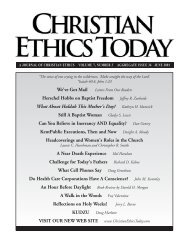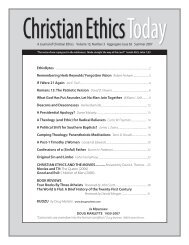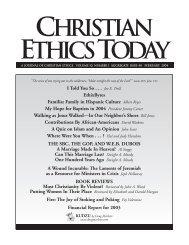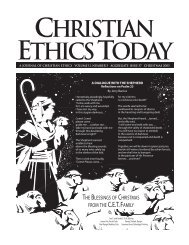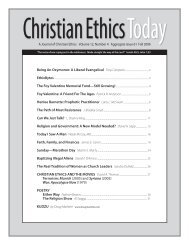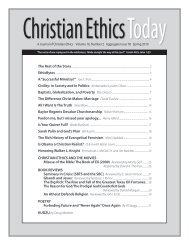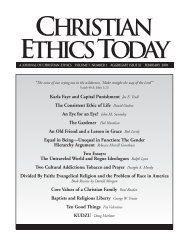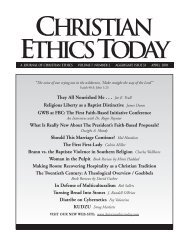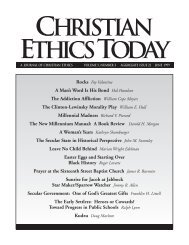Issue 052 PDF Version - Christian Ethics Today
Issue 052 PDF Version - Christian Ethics Today
Issue 052 PDF Version - Christian Ethics Today
You also want an ePaper? Increase the reach of your titles
YUMPU automatically turns print PDFs into web optimized ePapers that Google loves.
decisions required to keep an institution functioning<br />
smoothly, it was nearly impossible to apply ethical considerations,<br />
i.e. the functioning of the school outweighed any<br />
attempt at reclamation of the individual. The other former<br />
dean was less harsh and in the first case suggested doing<br />
everything possible to salvage the individual in counseling<br />
and aiding her in relocation, but like his cohort would put<br />
the organization’s overall good above that of the individual.<br />
One conclusion from these interviews was that these men<br />
“had been there and done that” and spoke from their practical<br />
experience.<br />
The final interview was with a retired president of a<br />
Baptist seminary in another country, who earned a PhD in<br />
<strong>Ethics</strong> from Baylor. He used a slightly different ethical<br />
approach and recognized that being honest in employee<br />
treatment, with the business owners in mind, could conflict<br />
with what might be best for the employee. However, like the<br />
others interviewed, ultimately he would put the best interests<br />
of the business ahead of the best interests of the employee.<br />
These interviews can be contrasted with the view of<br />
Henry Krabbendam, who suggests ethical businessmen<br />
“must meet the requirements of a biblical motivation, a biblical<br />
standard, a biblical goal, a biblical decision-making<br />
process and a biblical prospect.” 8 He sets the standard as<br />
<strong>Christian</strong> love that impacted greatly on how employees<br />
should be treated. He also suggested motivation, when<br />
thought of in terms of service and self–sacrifice, as a key factor<br />
in impacting employee relations. In the decision making<br />
process he looked to the book of James and stated “To make<br />
decisions and settle issues, therefore, that are ethical in<br />
nature, James invites us to assess a situation and search out<br />
possible implications with sanctified sense, determine how it<br />
looks in the light of the law of love, and apply the Decalogue<br />
thus formulating in a sense a brand-new case law.” 9<br />
In the first case should the human relations manager<br />
attempt to salvage a person that was headed in a direction<br />
that ultimately would lead to her ruin? Phrased in such a way<br />
the obvious answer is “yes.”<br />
As a secondary challenge, would it be ethically proper for<br />
the human relations manager to ask a lawyer, engaged solely<br />
to handle specific litigation, to utilize his time (which the<br />
company was compensating at $150 per hour) for what easily<br />
could prove to be countless hours of counseling? Leaving<br />
aside the lawyer’s ethical challenge of charging the company<br />
for work that was unassigned and not within the scope of the<br />
engagement, what ethical obligations should a company owe<br />
to society, in consideration of doing business in society, to<br />
provide growth and on occasion rehabilitation for one of<br />
society’s members?<br />
Should the basic principal of <strong>Christian</strong> ethics, to imitate<br />
God, 10 be applicable to the business world? 11 Certainly every<br />
businessperson is not going to accept “ethical behavior” as<br />
necessarily originating out of a religious context, and it is difficult<br />
for <strong>Christian</strong> ethicists to ignore ethical systems that are<br />
not based on the <strong>Christian</strong> religion. The moral teachings of<br />
the Decalogue, 12 excluding those pertaining to God, to a<br />
20 • CHRISTMAS 2004 • CHRISTIAN ETHICS TODAY<br />
great extent are found in the Hammurabi Code 13 and a number<br />
of other preserved ancient laws. 14 Can it be said, in twenty–first<br />
century America, that religion and ethics are<br />
inseparable? In other words, are ethics exclusively theocentric?<br />
For many human relations managers the answer would<br />
be no, but since the presupposition of this article is yes, then<br />
the question must be asked, “How should this potential executive<br />
secretary be treated?” Guidance from the Old<br />
Testament indicates that workers (slaves) were to be treated<br />
with generosity. 15 Application of this principle to the secretary<br />
in question would require something in addition to a<br />
reprimand or termination.<br />
Should <strong>Christian</strong> ethical teachings extend into economic<br />
relations only as far as they are workable? This is the view of<br />
one author who he states the presumption that “every human<br />
being is made in the image of God and therefore possesses<br />
incalculable worth and dignity.” 16 Thus every individual is a<br />
repository of certain inalienable rights. It is the belief that the<br />
supreme purpose of human existence is neither to accumulate<br />
money, nor to provide goods and services for society, but<br />
to glorify God.<br />
The same author states “the vast structures of industry<br />
and commerce are means to the end of enabling people to<br />
live for God’s glory.” 17 However, Chewing has an interesting<br />
twist in application for he concludes that the ethical manager<br />
must consider the profits for which the owners operate the<br />
business. If the profit side of the business is ignored the business<br />
possibly can fail, which hurts both the investors and the<br />
employees. After noting the <strong>Christian</strong> businessman is confronted<br />
with the inescapable conflict between his responsibility<br />
to the investors of the business and in the implementation<br />
of biblical principles, he gives a scriptural solution: “If any of<br />
you lacks wisdom, he should ask God who gives generously<br />
to all.” 18<br />
The human relations director in the first case has several<br />
avenues of approach. Initially a decision must be made<br />
whether the employee is marginal and should be terminated or<br />
alternatively effort should be made to salvage the individual as<br />
an employee. Assuming the decision is to retain the employee,<br />
if possible, the first and most obvious initial approach would<br />
be counseling. Since she nearly always completed her work<br />
before the end of the workday, there would be time to counsel<br />
with her without interfering with her production.<br />
The counseling could cover the challenges she presented<br />
to the company, the potential she could have with the company,<br />
and the errors of her ways, indicate the ultimate results<br />
both in her private life and in her employment for a continuation<br />
of her lifestyle. If counseling failed to have the desire<br />
effect the next step probably would be to issue a written<br />
warning in accordance with the company’s policy as printed<br />
in the procedures manual and furnish her with a copy of the<br />
procedure so she would be fully informed about the next step<br />
and then give her ample opportunity for correction.<br />
Ultimately, however, if her attitude and work ethic did not<br />
change, for the good of the business she most probably<br />
should be terminated.



